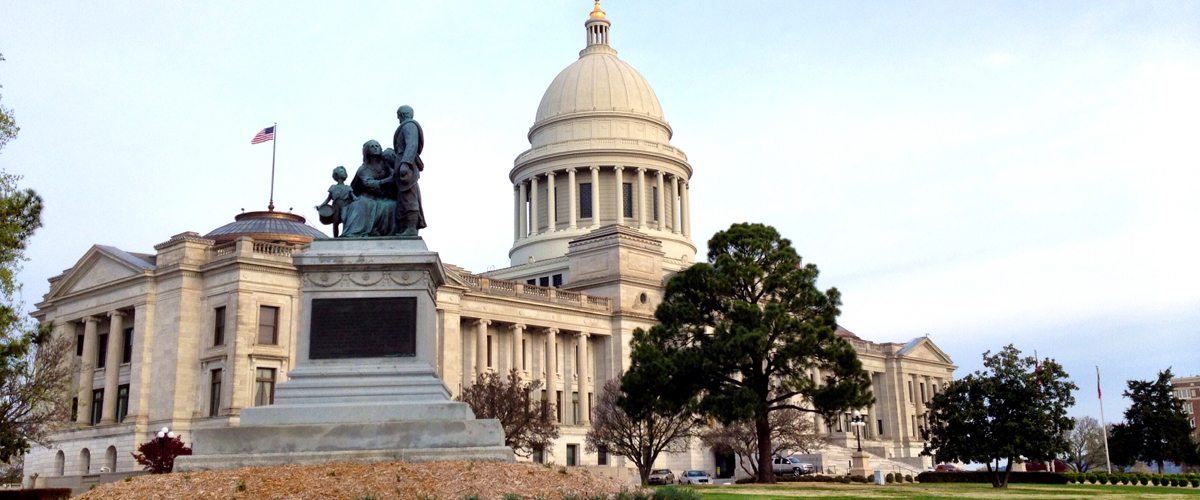<![CDATA[
Competing ballot initiatives in Arkansas rush to gain the necessary signatures to be placed on the ballot this November.
The legalization of marijuana in Arkansas has taken three steps forward as a trio of ballot initiatives race the clock to gain the number of signatures needed to make it onto the ballot in November.
The most recent ballot initiative to be approved by Arkansas Attorney General Leslie Rutledge includes both recreational and medical use of marijuana, making Arkansas the first southern state to seriously consider allowing recreational cannabis for adult use.
Rutledge has rejected 7 possible ballot initiatives since taking office in 2014, including 5 in the past 5 months, often citing ambiguous language as the reason. Arkansas now has three measures approved for the November ballot, as long as they collect the required signatures in time. Supporters of the ballot initiatives have until July 8th to submit the signed petitions to the state to be included in November’s vote.
The three competing ballot measures each take a unique position in the legalization of cannabis in Arkansas.
1. Arkansas Medical Cannabis Act
Written by the Arkansans for Compassionate Care, the Arkansas Medical Cannabis Act (AMCA) is designed to legalize medical marijuana for the broadest number of conditions, listing dozens of indications and stipulating the ability of the Arkansas Department of Health to add more.
The measure would provide for 38 non-profit care centers across the state to distribute medical marijuana. These care centers, like the rest of the administration of the act, will be overseen by the Arkansas Department of Health. Individual cities will have the right to ban the cannabis industry within their city limits.
Touted by its creators as the compassionate choice in legalization measures, the AMCA includes protections for patients: like offering low income patients a sliding pay scale, allowing patients 20 miles away from a care center to grow their own marijuana, and securing the rights of medical marijuana patients needing organ transplants or applying for employment.
The AMCA needs 67,000 signatures to appear on November’s ballot, but since it was approved in 2014 under the last Arkansas Attorney General, Arkansans for Compassionate Care have had years to raise awareness for their measure. It currently has 93,000 signatures at press time and still aims to add more, helping to secure their spot in November.
2. Arkansas Medical Marijuana Amendment
The second ballot measure, the first to be approved by Attorney General Rutledge, is the Arkansas Medical Marijuana Amendment (AMMA), submitted by David Couch, an attorney from Little Rock. This ballot measure is medicinal only, and the program will be overseen by the Alcohol Beverage Control Division.
Like the much maligned ballot initiative that failed in Ohio, the AMMA has been criticized for benefiting big companies over small business, including high licensing fees and limited numbers of cultivation and dispensary locations. However, the AMMA provides for 20-40 dispensaries, while the AMCA allows 38. Depending on the execution of the amendment, each measure could see similar numbers of outlets for patients. However, under the AMMA, 10 or fewer companies may end with control of the entire Arkansas market. One of the biggest knocks against the AMMA is that it changes possession of marijuana in Arkansas without a medical card from a misdemeanor to a felony, severely punishing those who don’t qualify under one of the few approved conditions.
While the AMCA adds language to protect patients, the AMMA provides for the betterment of the entire state. 60% of taxes under the Arkansas Medical Marijuana Amendment go to either the Skills Development Fund or the Vocational and Technical Training Special Revenue Fund, helping to build the future employment opportunities of those in Arkansas.
The AMMA also sets a stringent list of indications for the use of medical marijuana, including cancer, glaucoma, HIV/AIDs, epilepsy, PTSD, and intractable pain, among others. The list is quite limited compared to the AMCA, which has raised concern among patients.
Because David Couch is attempting to put an amendment on November’s ballot, his measure needs 85,000 signatures to qualify for the ballot. No numbers are yet available on their progress.
3. Arkansas Cannabis Amendment
Probably the most ambitious measure to be approved by the Arkansas Attorney General, the Arkansas Cannabis Amendment (ACA) would fully legalize marijuana in the state, effectively ending prohibition. The amendment was put forth by Mary Berry and Arkansas True Grass, a grassroots hemp and marijuana legalization movement.
This progressive initiative will legalize the cultivation, production, distribution, sale, possession, and use of both medical and recreational marijuana. The ACA would also allow personal grows of up to 36 plants. The amendment would also permit driving under the influence of marijuana and require businesses to permit activities relating to marijuana in the workplace.
Additionally, the ACA requires the release all those in the prison system for marijuana related crimes, including those on probation or parole, and would expunge all marijuana crimes from criminal records in the state.
The ACA also divides cannabis into industrial hemp and marijuana based on THC percentages, with industrial hemp being any cannabis cultivar with a THC percentage under 0.3% by dry weight, allowing farmers in Arkansas to competitively participate in the growing domestic hemp industry.
Finally, the ACA allows minimal sales and excise taxes on recreational use, and no tax will be levied on medical use, making it the most affordable marijuana reform for patients.
The ACA needs 85,000 signatures by July 8th. Because it was the last ballot initiative to be approved, it has the smallest amount of time to get the needed signatures on its petition.
24 states have already passed medical marijuana legislation, giving access to medical marijuana to 51% of U.S. citizens. There are nearly a dozen more states with ballot initiatives being voted on in November for the legalization of both the medical and recreational use of marijuana. To learn more about Arkansas marijuana laws, visit our education page. ]]>






